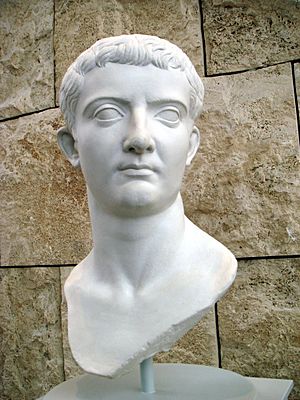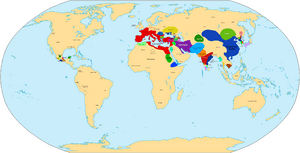1 facts for kids
| Millennium: | 1st millennium |
|---|---|
| Centuries: | 1st century BC – 1st century – 2nd century |
| Decades: | 20s BC 10s BC 0s BC – 0s – 10s 20s 30s |
| Years: | 3 BC 2 BC 1 BC – 1 AD – 2 AD 3 AD 4 AD |
| Gregorian calendar | AD 1 I |
| Ab urbe condita | 754 |
| Assyrian calendar | 4751 |
| Balinese saka calendar | N/A |
| Bengali calendar | −592 |
| Berber calendar | 951 |
| Buddhist calendar | 545 |
| Burmese calendar | −637 |
| Byzantine calendar | 5509–5510 |
| Chinese calendar | 庚申年 (Metal Monkey) 2697 or 2637 — to — 辛酉年 (Metal Rooster) 2698 or 2638 |
| Coptic calendar | −283 – −282 |
| Discordian calendar | 1167 |
| Ethiopian calendar | −7 – −6 |
| Hebrew calendar | 3761–3762 |
| Hindu calendars | |
| - Vikram Samvat | 57–58 |
| - Shaka Samvat | N/A |
| - Kali Yuga | 3101–3102 |
| Holocene calendar | 10001 |
| Iranian calendar | 621 BP – 620 BP |
| Islamic calendar | 640 BH – 639 BH |
| Javanese calendar | N/A |
| Julian calendar | AD 1 I |
| Korean calendar | 2334 |
| Minguo calendar | 1911 before ROC 民前1911年 |
| Nanakshahi calendar | −1467 |
| Seleucid era | 312/313 AG |
| Thai solar calendar | 543–544 |
| Tibetan calendar | 阳金猴年 (male Iron-Monkey) 127 or −254 or −1026 — to — 阴金鸡年 (female Iron-Rooster) 128 or −253 or −1025 |
The year 1 AD was a very important year. It marked the beginning of a new century and a new millennium.
In the Julian calendar, it was a common year that started on a Saturday. In the Gregorian calendar, it started on a Monday.
This year is special because its number, 1, can be written with just one Roman numeral: I. Only a few other years can do this: 5 AD (V), 10 AD (X), 50 AD (L), 100 AD (C), 500 AD (D), and 1000 AD (M).
Back then, people in Rome called it the Year of the Consulship of Caesar and Paullus. The way we use "1 AD" today started much later, during the medieval period. This is when the Anno Domini (meaning "in the year of the Lord") calendar system became popular in Europe. The year right before 1 AD was 1 BC.
Contents
Important Events Around the World
Roman Empire Happenings

- Tiberius, a powerful Roman general, worked to stop rebellions in Germany. He did this under the orders of Emperor Augustus. These efforts continued for several years.
- In Rome, Gaius Caesar and Lucius Aemilius Paullus became the main leaders, known as consuls.
- The famous Roman poet Ovid wrote his epic poem called Metamorphoses.
- A new aqueduct called the Aqua Alsienta was built in Rome. Aqueducts were like ancient water pipes that brought fresh water into the city.
- Silk, a luxurious fabric, started to appear more often in Rome. It was brought from faraway lands like China.
Events in Asia
- In China, the Yuanshi era began for the Han Dynasty. This was a new period of time for the emperors.
- Confucius, a very wise Chinese teacher and philosopher, was given his first royal title after his death.
- Buddhism, a religion and philosophy, was introduced into China.
- The reign of Emperor Ping of Han China began. He was a young emperor who ruled the Han Dynasty.
Developments in Africa
- The ancient city of Axum in what is now Ethiopia was founded around this time. Axum later became a powerful kingdom.
Changes in the Americas
- In South America, the area of Moxos became less important as a religious center.
Arts, Sciences, and Religion
- The Roman poet Ovid completed his long poem, Metamorphoses. This poem tells many stories from Greek and Roman myths.
- Livy, a Roman historian, was writing his huge work called History of Rome (Ab Urbe Condita). It covered the entire history of Rome up to his time.
- Some scholars believe that Jesus was born in 1 AD, based on the calculations made by Dionysius Exiguus for the anno Domini calendar. However, most experts think Dionysius actually placed Jesus's birth in the year before, 1 BC.
People Born in 1 AD
- Lucius Annaeus Gallio, who later became an important Roman official (died in 65 AD).
- Quinctilius Varus, the son of a famous Roman general (died in 27 AD).
- Pallas, a Greek freedman who became a powerful political advisor in Rome (died in 65 AD).
People Who Died in 1 AD
- Arshak II of Iberia, who was a king of the Kingdom of Iberia (a kingdom in the Caucasus region).
See also
 In Spanish: Uno para niños
In Spanish: Uno para niños
 | Stephanie Wilson |
 | Charles Bolden |
 | Ronald McNair |
 | Frederick D. Gregory |


